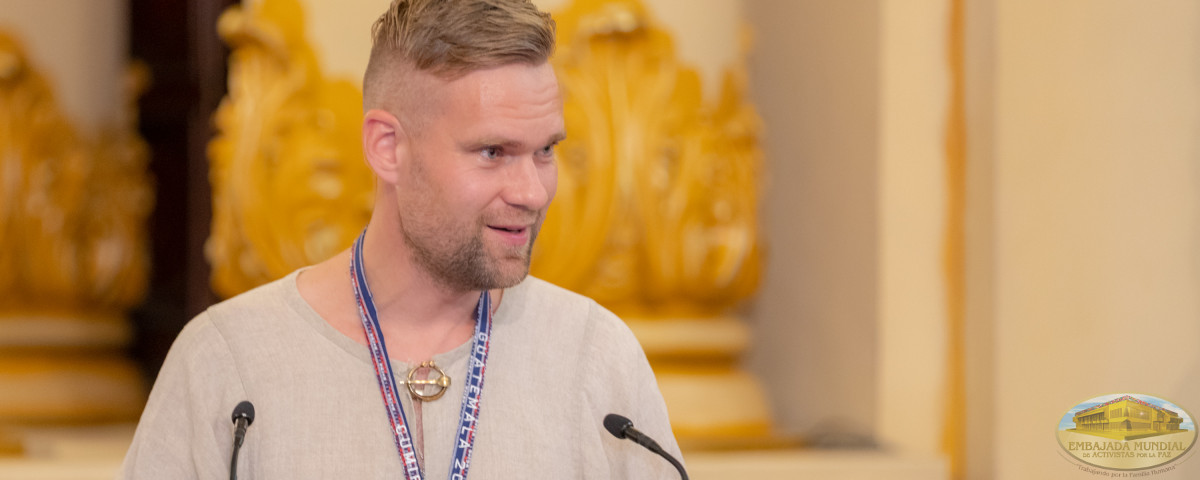
Sr. Dmitrii Kharakka-Zaitsev | Words in opening ceremony, Session Science, CUMIPAZ 2018
Related Video:
Mr. Dmitrii Kharakka-Zaitsev
Representative of the United Nations Permanent Forum of Indigenous Peoples (Russian Federation)
[IN SPANISH] Thank you.
Thank you. Dear brothers and sisters, on behalf of the United Nations and myself personally, let me congratulate you for these high profile meetings.
The United Nations Declaration on the Rights of Indigenous Peoples 2007 is a code of international principles of indigenous peoples rights. It stipulates the minimum standards to be executed by authorities to preserve and support Indigenous People.
Our permanent forum on Indigenous issues pays great attention to each area covered by this declaration. During its annual session, we carefully examined negative and positive practices which exist in certain Member States. Also, we work on it in between the sessions. We work together with the Indigenous communities, non-governmental organizations, United Nations mechanisms, and of course, authorities and state institutions, to find out the most effective measures to stop or devote the violations of unconformities, and to develop and to improve the mechanisms which were already implemented. But we will never find the answer without hearing and listening to indigenous people, their voices and their initiatives.
That is why such platforms as CUMIPAZ and certainly this conference, is important for connecting indigenous people, academics, officials, to hear each other, put into agenda the actual issues, and to find out the compromises and solutions. This is a dialogues which we always need and which we must support.
The last session of the Permanent Forum was dedicated to the problematic of indigenous territories and different spheres of Indigenous life within these territories. The mode and tendencies always find their reflection in our final recommendation, in our resolution.
I would like to mention that, taking into account the recommendations prepared by the Permanent Forum members in 2016, United Nations General Assembly proclaimed the year of 2019, so it's the next year, as the International Year of Indigenous Languages. And I urge you and I call you to participate in the action plan for the indigenous languages revitalization.
This is the kind of reaction to the current situation. Unfortunately, in many regions of the world we still observe disrespect for indigenous core values; we observe destruction of the indigenous environments, window dressing activities, evasion of generally recognized principles and statutes introduces by national legislature. We see manipulations and we see arrangement in the conditions for assimilation.
I regret that many of the state authorities, in any manner whatsoever, forgot their place and their role; they forgot why we have the State, why and for what reasons we have the government and its apparatus.
Now it is the time to reconsider the approaches to reevaluate measures and to change their attitude in terms of indigenous people, their languages, cultures, natural and traditional resources, current and future lives. However these changes are possible only with the authentic feeling of decision-makers.
Permanent Forum always mentions that indigenous peoples are not an enemy of the State, only because they are asking to exercise their rights. Indigenous peoples are the persons with active citizenship; they are stakeholders and human beings. It is necessary to remind to the States that in jurisprudence, in the theory of law, there are two well determined legal constructions: Crime of omission and criminal action. Omission is less visible, but equally dangerous to such crimes as forced assimilation, migration, genocide, and ecocide.
During the 20th century, scholars all over the world have been making efficient efforts in indigenous languages studies, accumulating knowledge and linguistic data to preserve languages. Indigenous people sharing their knowledge with researchers in the hope that it will help the next generations to use the language, to preserve culture, and to transfer the heritage to young people for the continuation of life.
Nevertheless, we see that many languages and many intangible heritages are well-preserved in scholars records, only in their records, while indigenous people living at their historical lengths suffer lack of language teachers, absence of educational systems, inability to implement good practices in revitalization of languages. They have to survive under the industrial pressure with a lack of access to their traditional natural resources such as forest, water, sea, land. We shall meet the challenge and initiate practical and efficient actions together with indigenous people and the states to save or revitalize their languages and cultures in their living form.
I believe that the top priority is revitalization of indigenous languages and cultures at indigenous territories and within indigenous territories. This must include preservation of traditional cultures, social and ecological environment as an integral system. Only the systematic and comprehensive approach may help achieve practical results.
[IN SPANISH] Esteemed ladies and gentlemen, esteemed brothers and sisters, thank you for the invitation and the opportunity to participate in a conference of such high level. I wish all of you a happy and productive work.
Thank you.
MODERATOR
Thank you to Dimitri Karakka-Zaitsev Co-Vice President of the United Nations Permanent Forum on the indigenous topic.
Today we also have the immense honor of counting with the presence of the 2007 Nobel Peace Prize Laureate, Dr. Rajendra Pachuari, Former President of the Intergovernmental Group of Experts on Climate Change. He was in this position from 2002 up to his resignation in 2015. The institution obtained the Nobel Peace Prize in 2007.
He has also been the General Director of TERI, an organization dedicated to research and public policies in India; is Chancellor of the University of TERI, and also president of the Board of Directors of the National Agro Association, as well as the President of the Board of the International Research Institute for Climate and Society of the University of Columbia. It is an immense honor to have with us the 2007 Nobel Peace Prize Laureate, Dr. Rajendra Pachuari.